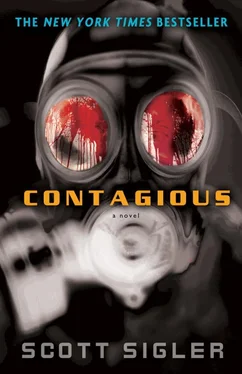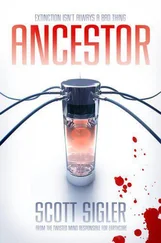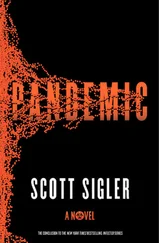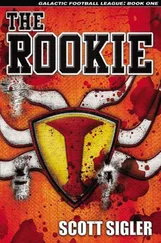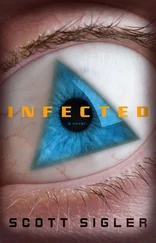Margaret sat down at the table, opposite the little body on the floor. She did it so casually it could have been a normal scene in any kitchen, save for her black biohazard suit and the corpses.
“No, Perry, Clarence didn’t say that. And no, I don’t want a beer, but thank you. You’ve got to stop this.”
“Stop drinking? Why, what a great idea. Sobriety has done so much for me.” He finished the beer and grabbed another. The buzz was really kicking into gear now. He wanted it, needed it to take over so he could forget. If he got drunk enough, maybe he could sleep.
“Perry,” Margaret said, “look around you. Look what you’ve done. You killed these people.”
“Why do you all keep saying they’re people ? They were the walking dead.”
“No they weren’t, damn it. I saved you, didn’t I?”
“And what a delightful experience that was.”
“I know it was painful,” she said.
Perry laughed. “Yeah. Painful. By the way, you sure your last name isn’t Mengele, not Montoya?”
“Oh, you can just kiss my ass, Perry,” Margaret said. “I saved your life. Amos and I figured out how all by ourselves, because trust me, your disease wasn’t exactly listed in Wikipedia. I know it hurt, but I saved your life—and you compare me to Josef Mengele? How about instead you just say thank you for saving my life , Margaret .”
“And you said I wasn’t good at pushing buttons.”
It was funny how clearly you could see emotions through one of those visors. Margaret’s eyes narrowed, and her upper lip wrinkled up just a bit. Frickin’ adorable.
“Don’t forget, Doc, I gave you quite a head start,” Perry said. “I didn’t have any triangles when you got to me, remember? And you can look around all you want, but you won’t see any Chicken Scissors laying around. These people didn’t even try.”
She looked away. Everyone did when he mentioned the scissors. She took a slow breath, then looked at him dead-on again.
“Perry, I learned so much from helping you recover. I can save these people. Why do you think Dew is trying so hard to bring them in alive?”
Perry looked at Margaret, looked into her brown eyes. She had saved his life, that was true. Most of the time he wished she hadn’t.
It was so hard to believe there was a person as good as Margaret left in the world. It was also hard to believe there was a person this naive.
“You’re kidding yourself, lady,” Perry said. “You can’t save them.”
“I can, Perry, and I will. We need your help, more than just finding the hosts. You still won’t tell us anything about your experience. Do you know how frustrating it is when the one person who survived won’t tell you the most basic information?”
Perry shook his head. “I don’t talk about that.”
“I’ve noticed,” Margaret said. “Look, everyone understands it’s traumatic. Believe me. You have to overcome this. I know you don’t want to think about what happened with Bill, but—”
“ Don’t talk about him!” Before the words were even out of his mouth, Perry leaned toward her and banged the table hard with his fist. Margaret flinched, eyes wide in surprise and fear. Clarence’s gun came up, leveled right at Perry’s chest.
Perry quickly leaned back. Goddamit. He’d lost it. Scared Margaret. That was the last thing he wanted to do.
Margaret looked back at Clarence. “Put that damn thing down.”
Clarence lowered the gun.
“My bad,” Perry said.
She put her gloved hand on his forearm. “Don’t worry about it. I’m sorry to bring up awful memories, but you’ve got to start doing the right thing.”
“The right thing?” He stood and set a fresh beer bottle on the table in front of her. A gift. She wouldn’t drink it, but it’s the thought that counts.
“You’re a smart cupcake, Margo,” Perry said. “But you don’t know the right thing here. Trust me, the right thing is to let me help them.”
“Like you helped these people?”
Perry nodded. “Exactly.”
He started to walk out, then stopped and turned to face her. “And that suit, Margaret. That’s the worst suit I ever saw. You buy a suit like that, I bet you get a free bowl of soup.”
“But it looks good on you,” Margaret said. “ Caddyshack. I own that one, too.”
Perry smiled and gestured toward Otto, who looked horribly uncomfortable at the whole situation. “Margie, you’re too cool for Mister Funbags over there. Enjoy your new playmates.”
He walked out of the kitchen, hoping that one beer he’d left Margo wasn’t the that would have pushed him over the top.
He needed to sleep. Sleep, without hearing Bill’s voice.
Dew waited in his car while Anthony Gitsham and Marcus Thompson connected the two semi trailers to make the MargoMobile fully operational. The two trailers weren’t really trailers, they were flatbeds, each carrying a container that was eight feet wide by ten feet high by forty feet long. As standard-size cargo containers, the things could easily be transported by rail, by ship or even by air with a cargo helicopter. Once combined, the two containers made for a highly portable BSL-4 autopsy facility.
Painted blue and scuffed up a bit to make them look rusty and well used, they didn’t rate a second glance on the highway. But it was only the outsides that looked beat up—the inside areas gleamed with the pristine whiteness of a high-tech hospital.
Three months ago there’d been no such thing as a mobile lab rated for BSL-4. That was as bad as it got—ebola, Marburg, superflu, shit like that. Some company had had the trailer on the drawing board. Margaret found out and insisted it was just the thing for the crazy, secret work of Project Tangram. Dew had agreed. So had Murray, who’d funded the rush job on a prototype and then ordered two more. At a this-week-only sale price of $25 million each.
Fuck it, Murray had said, it’s only taxpayers’ money .
The things you could do with a black budget. When the trailers were delivered and the team checked them out, Amos had called them the MargoMobile, and the name just stuck.
Big dollars or no, Dew couldn’t argue with Margaret—the trailer combo was a bargain at any price. The BSL-4 tents Margaret had used at various hospitals worked, but you needed to set them up, you had to deal with a concerned hospital staff, local media, et cetera. The MargoMobile solved that. You could take the full BSL-4 lab right to the bodies and do what had to be done. The thing even had a microwave incinerator, for fuck’s sake—one-stop shopping from body acquisition to disposal.
The two trailers set up in parallel. From the rear, the right trailer, Trailer A, had normal cargo doors. Opening those up revealed two more doors—the cargo doors were just a front. The door on the left led into a small computer center, ten feet long by five feet wide. One thin desktop ran the length of the room. It supported three keyboard-and-mouse combinations that rested in front of three flat-panel monitors mounted on the walls. Add three office chairs and you were in business. Other equipment provided secure encrypted transmission to anyone on the trailer’s frequency or could plug into a full NSA-caliber satellite uplink. Voice, video, data, whatever you needed. The communication equipment was originally meant to provide a secure connection to the CDC or the WHO, but it worked just as well for an old CIA spook.
The right-side door led into a claustrophobic, three-foot-wide airlock that ran ten feet into the trailer before it reached a second airtight door. That door opened into the eight-by-ten-foot decontamination center. In there, dozens of nozzles shot out a high-pressure combination of chlorine gas and concentrated liquid bleach. Lethal to anything from a microbe to a man. Once you got through decon, a final airtight door let into the main area: an eight-foot-wide, twenty-foot-long autopsy room. An area about the size of a typical living room to deal with the deadliest pathogens the world had to offer.
Читать дальше
